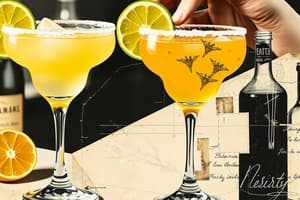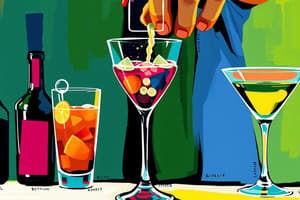Podcast
Questions and Answers
What is the primary purpose of using different glassware in mixology?
What is the primary purpose of using different glassware in mixology?
- To enhance the aroma and appearance of a cocktail (correct)
- To make a cocktail more filling
- To change the flavor profile of a spirit
- To add a decorative touch to a cocktail
Which tool is essential for mixing cocktails and is used to combine ingredients with ice?
Which tool is essential for mixing cocktails and is used to combine ingredients with ice?
- Jigger
- Cocktail strainer
- Muddler
- Boston shaker (correct)
What type of cocktail includes spirits, citrus juice, and simple syrup?
What type of cocktail includes spirits, citrus juice, and simple syrup?
- Sour (correct)
- Muddle
- Highball
- Fizz
What is the purpose of muddling in mixology?
What is the purpose of muddling in mixology?
What is the primary purpose of using a garnish in a cocktail?
What is the primary purpose of using a garnish in a cocktail?
What type of mixer is used in a Highball cocktail?
What type of mixer is used in a Highball cocktail?
When was the term 'mixology' coined?
When was the term 'mixology' coined?
Which ancient civilization created mixed drinks using fruits, herbs, and spices?
Which ancient civilization created mixed drinks using fruits, herbs, and spices?
Who is considered the father of American mixology?
Who is considered the father of American mixology?
What is the name of the first cocktail book published in 1862?
What is the name of the first cocktail book published in 1862?
What is the main ingredient in an Old Fashioned cocktail?
What is the main ingredient in an Old Fashioned cocktail?
What is the name of the cocktail that consists of tequila, lime juice, and triple sec?
What is the name of the cocktail that consists of tequila, lime juice, and triple sec?
During which era did iconic bars, bartenders, and cocktails rise to prominence?
During which era did iconic bars, bartenders, and cocktails rise to prominence?
What is the name of the cocktail that consists of vodka, triple sec, cranberry juice, and lime juice?
What is the name of the cocktail that consists of vodka, triple sec, cranberry juice, and lime juice?
Flashcards are hidden until you start studying
Study Notes
Basics of Mixology
- Glassware: Different glasses are used for various cocktails to enhance the aroma and appearance.
- Bar Tools: Essential tools include a Boston shaker, jigger, muddler, and cocktail strainer.
Cocktail Components
- Spirits: Base spirits such as gin, vodka, rum, whiskey, and tequila.
- Modifiers: Add flavor and texture with liqueurs, syrups, and cream.
- Mixers: Juices, sodas, and other ingredients that dilute the spirits.
Cocktail Categories
- Sours: Spirits, citrus juice, and simple syrup (e.g., Whiskey Sour).
- Highballs: Spirits and a non-alcoholic mixer (e.g., Gin and Tonic).
- Muddles: Fresh fruits and herbs mixed with spirits and modifiers (e.g., Mojito).
- Fizzes: Spirits, citrus juice, and a carbonated mixer (e.g., Gin Fizz).
Cocktail Mixing Techniques
- Shaking: Combine ingredients with ice in a shaker to chill, dilute, and emulsify.
- Stirring: Mix spirits, modifiers, and mixers without ice to preserve clarity.
- Muddling: Gently press fruits and herbs to release flavors and oils.
Cocktail Garnishes
- Fruits: Wheels, wedges, or slices used to garnish cocktails (e.g., orange wheel for an Old Fashioned).
- Herbs: Fresh herbs like mint, basil, or rosemary add flavor and aroma.
- Garnish tools: Use a garnish pick, cherry, or olive to add a decorative touch.
Glassware and Bar Tools
- Specialized glasses enhance aroma and appearance of cocktails
- Essential bar tools: Boston shaker, jigger, muddler, and cocktail strainer
Cocktail Components
- Spirits: Base spirits include gin, vodka, rum, whiskey, and tequila
- Modifiers: Liqueurs, syrups, and cream add flavor and texture
- Mixers: Juices, sodas, and other ingredients dilute spirits
Cocktail Categories
- Sours: Combine spirits, citrus juice, and simple syrup (e.g., Whiskey Sour)
- Highballs: Mix spirits with non-alcoholic mixers (e.g., Gin and Tonic)
- Muddles: Blend fresh fruits and herbs with spirits and modifiers (e.g., Mojito)
- Fizzes: Combine spirits, citrus juice, and carbonated mixers (e.g., Gin Fizz)
Cocktail Mixing Techniques
- Shaking: Chill, dilute, and emulsify ingredients with ice in a shaker
- Stirring: Mix spirits, modifiers, and mixers without ice to preserve clarity
- Muddling: Gently press fruits and herbs to release flavors and oils
Cocktail Garnishes
- Fruits: Wheels, wedges, or slices used to garnish cocktails (e.g., orange wheel for an Old Fashioned)
- Herbs: Fresh herbs like mint, basil, or rosemary add flavor and aroma
- Garnish tools: Use garnish picks, cherries, or olives to add a decorative touch
Mixology History
- The term "mixology" was coined in the 19th century, but the art of mixing drinks dates back thousands of years to ancient civilizations such as Egyptians, Greeks, and Romans.
- Apothecaries and pharmacists experimented with mixing spirits in the 17th and 18th centuries, creating early versions of cocktails.
- The first cocktail book, "The Bon Vivant's Companion," was published in 1862 by Jerry Thomas, considered the father of American mixology.
- The Golden Age of Cocktails (1860s-1920s) saw the rise of iconic bars, bartenders, and cocktails, such as the Sazerac and the Sidecar.
Classic Cocktails
- Old Fashioned: made with bourbon or rye whiskey, sugar, bitters, and a twist of citrus.
- Martini: made with gin, dry vermouth, and an olive or lemon twist.
- Margarita: made with tequila, lime juice, and triple sec.
- Daiquiri: made with white rum, lime juice, and simple syrup.
- Manhattan: made with whiskey, vermouth, and bitters.
Popular Cocktails
- Cosmopolitan: made with vodka, triple sec, cranberry juice, and lime juice.
- Mojito: made with white rum, lime juice, mint leaves, and soda water.
- Pina Colada: made with rum, pineapple juice, and coconut cream.
- Long Island Iced Tea: a mix of spirits (vodka, gin, rum, tequila, and triple sec), cola, and lemon juice.
- Sangria: made with red wine, fruit juice, and fruits (such as orange, apple, and berries).
Essential Mixology Tools
- Cocktail shaker is a necessary tool for mixing drinks.
- Jigger or measuring cup is used to measure ingredients accurately.
- Muddler is used to gently press fruits and herbs to release flavors and oils.
- Bar spoon is used to mix and stir ingredients.
- Citrus juicer is used to extract juice from citrus fruits.
- Strainers and sieves are used to strain drinks to remove solid ingredients.
Fundamental Techniques
- Shaking: combining ingredients with ice in a shaker to chill and mix.
- Stirring: mixing ingredients without ice to preserve clarity and texture.
- Muddling: gently pressing fruits and herbs to release flavors and oils.
- Garnishing: adding a decorative element, such as a fruit slice or sprig of herbs, to the drink.
Studying That Suits You
Use AI to generate personalized quizzes and flashcards to suit your learning preferences.




